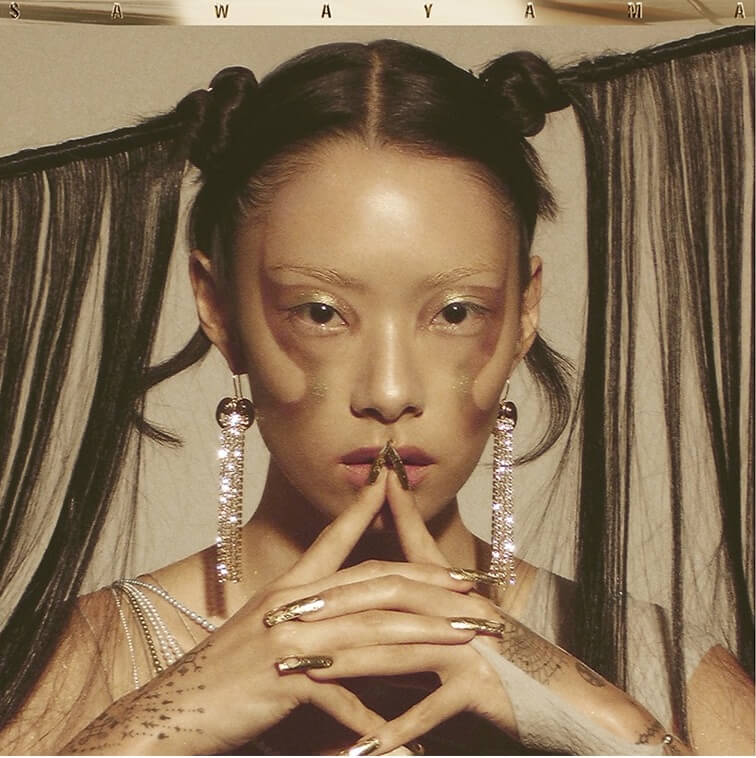Rina Sawayama’s debut album “Sawayama” tells us how she became the 29-year-old woman singing her story. The pansexual singer’s parents emigrated from Japan to the UK when she was five, getting divorced a few years later. Many of her songs describe her cross-cultural heritage, her attitude that “the pain in my vein is hereditary,” and her rebellious youth. It’s hardly an unusual immigrant’s tale, but how many pop singers have expressed it? Sawayama carries herself with a brash confidence — it’s no accident that the album’s first single is called “STFU!”
Its music video depicts her on a date with a nerdy white man who proves to be a weeaboo: a Westerner who fetishizes Japanese culture from a distance without respecting Asian people. Every sentence out his mouth is a reference to Asian culture, but usually a secondhand version of it: “Kill Bill,” “Memoirs of a Geisha,” airport sushi. When he asks Sawayama if she’s mixed-race, the music finally starts up, offering a nü-metal-inspired barrage of rage that turns more melodic on its chorus. But she flips a genre associated with lunkheaded machismo to sing about her anger at men like this one and the attitudes they represent: “Have you ever thought about taping your big mouth shut?/ ’Cause I have, 10 times.” The video goes on to represent her fantasies, which take images of women from Japanese pop culture but use them to turn the tables on racist and sexist condescension. It continues a critique of infantilizing beauty standards and stereotypes of Japanese women begun in “Asian Beauty,” a collaboration with photographer and temporary tattoo artist John Yuyi.
Sawayama has found success as a model, but “XS” both criticizes consumerism and acknowledges her complicity. It describes the demand for fashion as an addiction, returning to the chorus “give me just a little more/ excess. ” “XS” captures the compulsive nature of dependency, turning a catchy pop tune into a bleary-eyed description of life on a late capitalist treadmill. Its production is carefully structured, with acoustic guitars strummed on the verses and the chorus announcing itself with a percussive blast of electric guitar. Continuing the theme, “Comme Des Garçons” takes the name of the Japanese fashion line but spins it into an anthem of gender equality.
For an artist in her 20s, approaching music with a genre-agnostic attitude is the norm these days. Sawayama’s debut ep “Rina,” released in 2017, looked back at ‘90s R&B. This album is full of loud electric guitar, drawing on alt-rock from the late ‘90s and early ‘00s. In deploying nü-metal influences as a symbol of her anger, she joins other female singers like Poppy and Grimes. She told the British website NME, “I kind of like making really uncool things cool.” But whatever genre she uses, “Sawayama” is clearly grounded in her personal experiences, benefiting from the fact that she’s old enough to look back on her teenage years and see her mother’s perspective, too.
“Akasaka Sad,” which is sung in both Japanese and English, and “Dynasty” tackle the traits Sawayama picked up from her parents. The latter returns to her nü-metal influences, with a melodramatic opening and breathy vocals patterned on Evanescence. If sports arenas were open now, it could be blasting away in them before football games. She describes the idea behind “Chosen Family” as “a queer one — people are often kicked out of their homes or ostracized by their family, friends, and community after coming out. This can be an incredibly painful experience that can be remedied by finding a new ‘chosen’ family.” However, it is one of her weaker songs, passing for a power ballad playing over the closing credits of a mediocre ‘80s action movie. The ambivalent turbulence of “Bad Friend,” whose music suggests Charli XCX experimenting with gospel, feels more heartfelt. The mildly glitchy production of “Akasaka Sad” also heads into future pop territory.
“Who’s Gonna Save U Now?” begins with a crowd chanting “Rina,” but Sawayama’s path to stardom has crashed into a world where rising musicians can’t promote their music or make money by touring. Prior to its public release, she promoted “Chosen Family” as a single by releasing the chords and lyrics — but not the entire song — to fans and inviting them to submit videos of themselves singing it. As isolation persists, she has kept up her Instagram channel Rina TV. Although “Sawayama” includes a few weak songs, the singer’s confidence is contagious. When she sings, “I’m the baddest, and I’m worth it,” she’s right.
RINA SAWAYAMA | “Sawayama” | Dirty Hit | Drops Apr. 17 | dirtyhit.co.uk
To sign up for the Gay City News email newsletter, visit gaycitynews.com/newsletter.

































